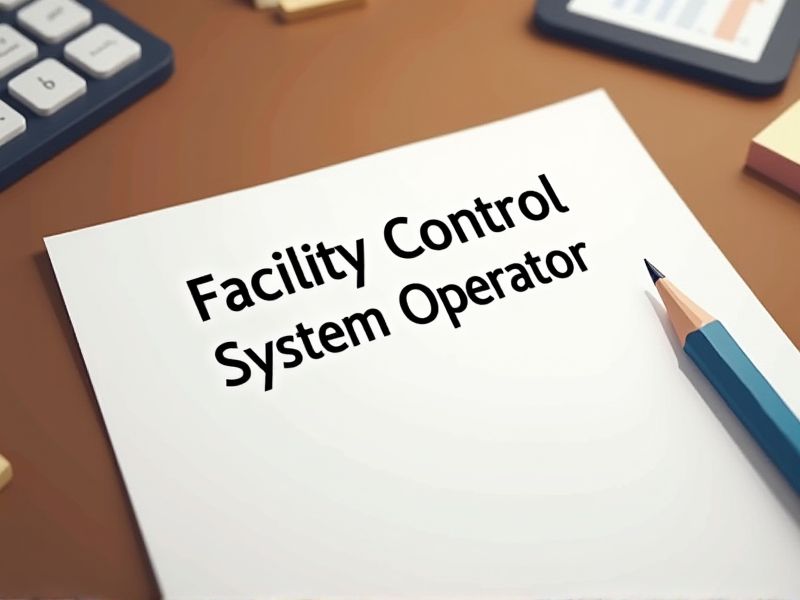
Facility Control System Operators oversee complex systems that require a deep understanding of technical processes, which certifications can provide. Certifications ensure operators are adept in specific software, safety standards, and operational protocols crucial for system efficiency. A lack of certified knowledge can lead to operational failures or safety hazards, underscoring the need for verified expertise. Essential certifications pivotal for a Facility Control System Operator include those focusing on technical proficiency and industry safety standards.
Certified Control Systems Technician (CCST)
Facilities often rely on complex control systems to maintain operational efficiency, and a Certified Control Systems Technician possesses the skills to ensure these systems function smoothly. Technicians with CCST certification provide expertise in troubleshooting and maintaining control systems, reducing downtime risks in critical processes. Without effective maintenance by certified professionals, facilities may experience inefficiencies, leading to elevated operational costs. A CCST-certified technician brings verified knowledge in instrumentation and automation, which enhances the reliability of facility operations.
Certified Automation Professional (CAP)
CAP certification validates the expertise in designing and implementing control systems, which directly enhances the efficiency of facility operations. A certified professional can reduce system downtime by applying advanced troubleshooting skills acquired through the program. Employers see a reduction in operational costs due to improved system optimization led by a CAP-certified operator. The certification ensures adherence to industry standards, increasing safety and reliability in facility control systems.
Facility Management Professional (FMP)
The presence of a Facility Management Professional (FMP) ensures that the Facility Control System Operator has strategic guidance for optimizing operational efficiency. An FMP provides the necessary knowledge to maintain compliance with industry regulations, reducing the risk of legal issues. Their skills in asset management support the longevity of facility infrastructure, reducing long-term costs. Expertise in sustainable practices helps the operator integrate eco-friendly solutions, minimizing environmental impact.
Certified Facility Manager (CFM)
A Certified Facility Manager (CFM) ensures operational efficiency in a facility control system by providing expertise in systems integration and troubleshooting. Their training helps identify and mitigate risks, reducing potential downtime and maintenance costs. CFM credentials enhance credibility, which can lead to improved stakeholder trust and contract opportunities. Their knowledge in sustainability and energy management contributes to cost savings and environmental responsibility in facility operations.
OSHA 30-Hour Construction Safety Certification
The OSHA 30-Hour Construction Safety Certification provides in-depth knowledge of workplace safety standards, reducing risks of accidents and ensuring compliance with federal regulations. Facility Control System Operators, responsible for maintaining and monitoring critical systems, benefit from understanding hazard recognition and control measures specific to construction environments. Safety training empowers operators to identify potential safety violations early, averting costly shutdowns. Certification promotes a culture of safety, directly impacting overall productivity and worker welfare in facilities management.
NFPA 70E Electrical Safety Certification
NFPA 70E Electrical Safety Certification provides Facility Control System Operators with standardized knowledge to mitigate electrical hazards, potentially reducing workplace accidents. Proper training in NFPA 70E ensures operators understand electrical safety protocols, lowering the risk of personnel injury and equipment damage. Employers demonstrate regulatory compliance and due diligence when operators hold this certification, which can also lead to reduced liability and insurance costs. Certified operators contribute to a safer work environment, potentially increasing operational efficiency and minimizing downtime from electrical incidents.
Building Automation Systems (BAS) Technician Certification
Building Automation Systems (BAS) Technician Certification equips Facility Control System Operators with the necessary technical knowledge to manage complex systems. Certification ensures operators understand interoperability across different building systems, which leads to enhanced energy efficiency. Trained individuals can effectively troubleshoot and maintain systems, reducing downtime and operational costs. Industry-recognized certification boosts credibility and demonstrates competence in handling advanced automated technologies.
Programmable Logic Controller (PLC) Certification
Obtaining a PLC Certification for Facility Control System Operators ensures a deep understanding of complex automation systems. This certification enables operators to effectively troubleshoot and maintain automated equipment, minimizing downtime and optimizing efficiency. Employers often prefer certified operators, reducing the risk of operational errors and improving overall system reliability. This credential reflects a commitment to professional standards, broadening career opportunities in increasingly automated industries.
Industrial Internet of Things (IIoT) Fundamentals Certification
The Industrial Internet of Things (IIoT) Fundamentals Certification equips Facility Control System Operators with essential knowledge for optimizing system efficiency and reliability. Without such training, operators may struggle with integrating advanced IIoT technologies into existing legacy infrastructure. Understanding IIoT principles helps in predictive maintenance, reducing downtime and costs. Certification ensures that operators can securely manage data, mitigating risks of cyber threats within industrial facilities.
HVAC System Operations Certification
Obtaining an HVAC System Operations Certification equips a Facility Control System Operator with essential knowledge and skills in managing complex heating and cooling systems efficiently. This certification ensures adherence to industry standards, which directly impacts the sustainability and energy efficiency of building operations. Trained operators are more adept at troubleshooting and resolving potential issues, reducing downtime and maintenance costs. Certification often leads to higher professional credibility, positively influencing career advancement opportunities within the field.
Summary
When you acquire certifications as a Facility Control System Operator, your professional credibility and expertise immediately enhance. This qualification often leads to increased trust from employers and teams, fostering smoother operations and decision-making. Certified operators tend to access higher-paying job opportunities due to their demonstrated competence. Employers are also likely to prioritize certified professionals for leadership roles, recognizing their specialized skills in facility management.
